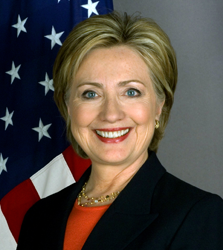
Clinton’s Nomination Struggles May Foreshadow Problems in General Election
Media attention is focused on businessman Donald Trump’s resounding win in the Nevada caucuses last night, and rightfully so. With nearly 46 percent of the vote, Trump finished with almost double his nearest rival, Florida Sen. Marco Rubio, and his share of the vote puts him close to the 50 percent number that would put to rest many of the assumptions about there being a ceiling on his support that limits his ability to win if and when the race becomes a two-person contest.
But the most interesting story of the day might be from National Journal political correspondent Josh Kraushaar, who takes a look at former Secretary of State Hillary Clinton’s struggles so far and sees problems for her in the general election if she wins the Democratic nomination:
Primaries a Preview of Clinton’s General Election Problems
Democratic turnout is noticeably down from its high-water mark in 2008, with significantly more GOP voters turning out in Iowa and New Hampshire. Republicans held a 15,700-vote turnout advantage in Iowa and a 33,000-vote edge in New Hampshire. Meanwhile, Nevada turnout was down 30 percent from the Obama-Clinton clash of eight years ago.
Clinton expected to rely on overwhelming support among women against Bernie Sanders, but only won 53 percent of their support in Iowa, 44 percent in New Hampshire, and 57 percent in Nevada. Among women under 45, she wasn’t even competitive with Sanders in the first two states. She’s still capable of running up the gender gap in a general election, but her surprising weakness in the primary underscores that younger women aren’t buying her message of sisterhood—and it will take more than just gendered appeals to turn them out against a Republican.
Younger voters across the country have outright rebelled against the prospect of a Clinton dynasty. Sanders won a whopping 84 percent of under-30s in Iowa, 83 percent in New Hampshire, and 82 percent in Nevada. Millennials were a critical component in Obama’s victories, casting aside their slacker reputations to turn out in record numbers in support of the president. Without Trump as a nominee, however, it’s very hard to see Clinton coming close to matching Obama’s rapport among this core Democratic constituency.
Meanwhile, despite her campaign’s best efforts to rally Hispanics by passionately advocating for immigration reform, there’s little sign that they’re following suit. Clinton’s campaign is probably right that they won the Hispanic vote in the Nevada caucuses, even with (flawed) entrance polls showing a narrow Sanders win. But she shouldn’t be celebrating too much. A narrow win over Sanders among Hispanic voters is hardly an encouraging sign, since Clinton overwhelmingly won their support in 2008 (64-26 percent over Obama) and has been much more outspoken on immigration than Sanders.
A recent article in Salon.com is too much of a cheerleading piece for Clinton’s rival, Vermont Sen. Bernie Sanders, to take as objective analysis, but it does raise some valid issues that some Democrats seem to be concerned over:
…American voters don’t trust Hillary Clinton. At what point will critics of Bernie Sanders realize that American voters will never vote for a candidate they don’t trust and don’t like?...
53.8% of all American voters have an “unfavorable” view of Hillary Clinton.
67% of American voters find Hillary Clinton “not honest and trustworthy,” compared with 59% for Donald Trump. Yes, more people trust Donald Trump….
71% of men and 64% of women find Clinton “not honest and trustworthy.”
74% of Independent voters find Clinton “not honest and trustworthy.”
35% of Democrats find Clinton “not honest and trustworthy.” Yes, even Democrats.
The November general election wouldn’t simply ask voters if they would like Clinton to be the next president, of course – there will be at least one other major candidate who brings his own shortcomings and issues into the election. But as Kraushaar’s piece points out, Clinton is not showing the sort of strength with important voter groups that her campaign would like to see, and she faces some serious challenges as a general election candidate.



